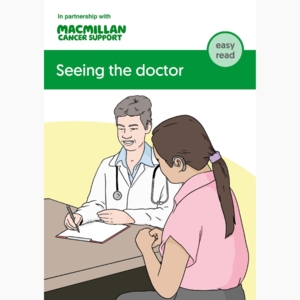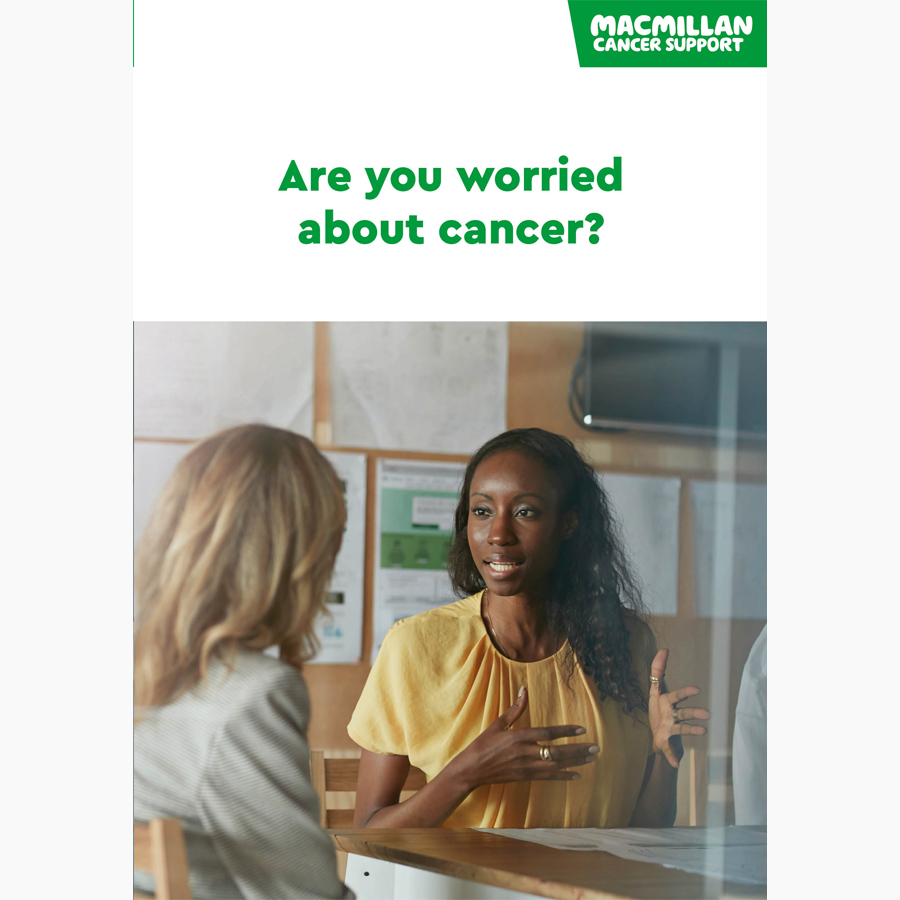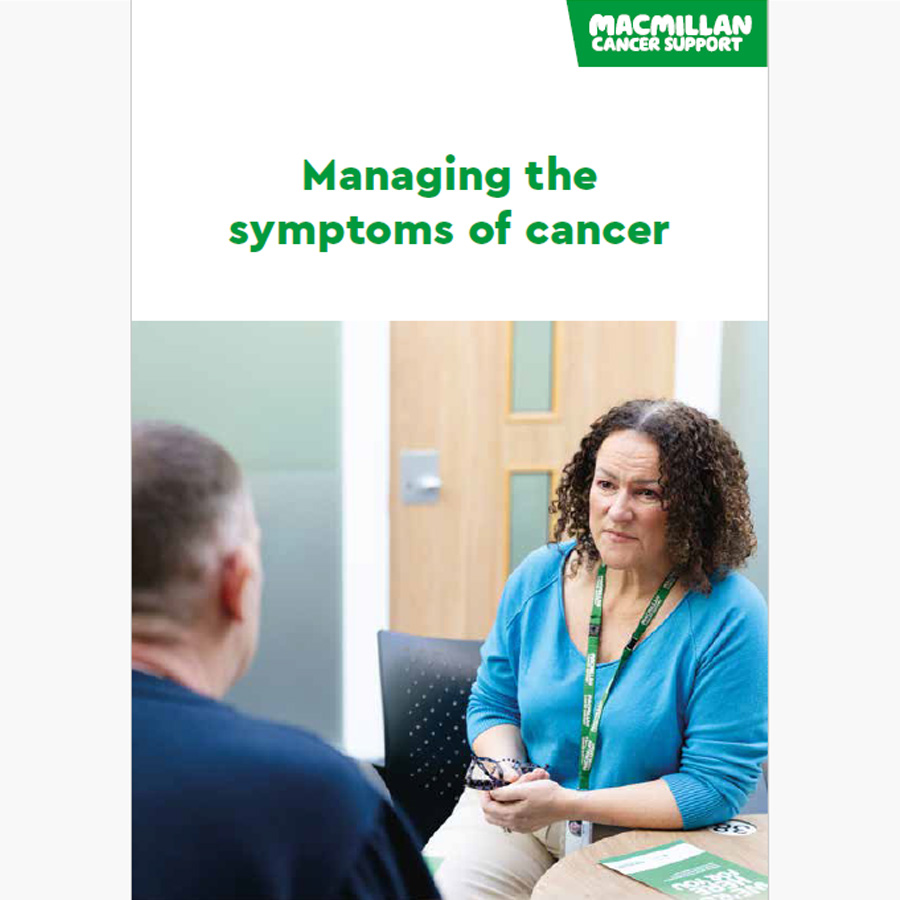Signs and symptoms of cancer
On this page
What are the signs and symptoms of cancer?
In this animation, you can learn about some of the signs and symptoms of cancer, and what to do if you have any symptoms, you are worried about.
Access our signs and symptoms animations without British Sign Language.
Spotting cancer symptoms earlier can help get a diagnosis when the cancer is at an early stage. For most cancers, this means treatment is more likely to be successful.
Different types of cancer have different symptoms. Signs and symptoms of cancer vary from person to person, even if they have the same type of cancer. Some people may have several symptoms, while other people have very few symptoms.
There are different ways of talking about symptoms:
- Ongoing symptoms last for more than a few weeks, or keeps coming back.
- Unexplained symptoms have no obvious or clear cause. For example, a new lump, or bleeding when you have not hurt yourself.
- Symptoms that are unusual for you are changes in your body that are not normal for you. For example, it could be a change in a cough you have had for a long time, or a change in a mole on your skin.
Related pages
When to go to your GP about symptoms
Symptoms caused by cancer can also be caused by other things.
It can be difficult to know whether you need to go to a GP. You may worry that you are wasting your GP's time. Or you might feel embarrassed or anxious talking about it.
It is important to know what is normal for you and your body. If you notice a change in how you feel or how your body works for a few weeks, it is safer to get it checked. A change usually does not mean you have cancer, but it could still be something that needs treatment.
If it is cancer, the earlier it is found, the more likely it is that it will be treated successfully. If it is nothing serious, your GP can reassure you.
When you visit your GP, it is helpful if you can tell them:
- what the symptom is
- how long you have had the symptom
- whether it is there all the time
- how often it occurs.
Your GP may ask you lots of questions. This will help them understand how to help you. It will also help them know whether you need to have any tests or see a specialist doctor.
Some symptoms are difficult to talk about, for example a lump on your testicle or vaginal bleeding. But even you find it embarrassing, it is important to get the symptom checked. Remember, your GP will be used to talking about difficult or embarrassing things.
If you need support or just want someone to talk to, call the Macmillan Support Line for free on 0808 808 00 00
You may also find it helpful to download or order our fold-out card on the possible signs and symptoms of cancer. You can also record any symptoms in our symptom diary.
Related pages
Booklets and resources
What symptoms to be aware of
If you have any of the symptoms listed here, talk to your GP. You are not wasting their time.
How bad or severe a symptom is does not tell you whether it is caused by a cancer or not. Usually, a doctor will need to examine you and you may need tests to find out what is causing your symptoms.
Having any of the symptoms we mention below does not mean you have cancer. But it is important to get them checked out.
General symptoms
Some symptoms are general. They may affect any part of the body, for example a lump, pain or a sore. Or they may affect your whole body, for example, tiredness.
-
Unexplained bleeding or bruising
Any unexplained bleeding should be checked with your GP. This can include:
- blood in your pee (urine), poo (stools), spit or vomit
- coughing up blood
- bruises when you have not hurt yourself
- vaginal bleeding between periods, after sex or after the menopause.
- blood in your semen.
-
Lumps or swellings
If you notice a new or unexplained lump or swelling anywhere on your body, talk to your GP. It can be useful to tell them:
- how long it has been there
- if it is getting bigger
- if it is painful or uncomfortable.
-
Pain
Tell your GP if you have pain anywhere in your body and you do not know what is causing it. It is important to tell your GP if the pain continues and does not show signs of getting better. Also tell them if you have pain that has changed in any way.
-
Severe tiredness (fatigue)
Tell your GP if you have ongoing, severe tiredness for no obvious reason.
-
Fevers or infections
It is normal to have a high temperature (fever) when you have an infection. You may also have sweats and hot flushes if you are going through the menopause.
But tell your GP if you have infections or unexplained fevers that:
- last a long time
- keep coming back
- cause regular heavy sweating, enough to soak your bedclothes, especially at night.
-
Weight loss
Tell your GP if you are losing weight:
- without trying to
- and have not changed your diet or how much physical activity you do.
Symptoms that affect different parts of the body
-
Mouth or throat problems - speech and swallowing difficulties
Talk to your GP if you have any of the following:
- A sore or ulcer in your mouth that lasts longer than 3 weeks, or you develop red or white patches in your mouth. You can also talk to your dentist about these symptoms.
- A hoarse voice that does not get better.
- Difficulty swallowing or chewing, or a feeling that something is stuck in your throat.
-
Eating problems and indigestion
Tell your GP if you:
- do not feel like eating as much as you normally do and this feeling continues
- feel full quickly when you eat, and this feeling continues
- get indigestion or heartburn most days, or if it is very painful or getting worse.
-
Swollen tummy
Tell your GP if you have a bloated or swollen tummy (abdomen) that happens often or lasts a long time. Feeling bloated can be caused by many different conditions but can be a symptom of some types of cancer.
-
Bowel changes
Lots of things can cause bowel changes, including a change in your diet. But they can sometimes be a symptom of bowel cancer.
If you have any of the following ongoing changes in when and how you poo (empty your bowels), tell your GP:
- loose or runny poo (diarrhoea)
- hard poo (constipation)
- needing to poo (empty your bowels) more often than usual
- changes to the usual routine of when you need to poo
- changes to the size or amount of poo when you go
- blood in your poo, on the toilet paper or in the toilet.
-
Problems peeing
Problems peeing (passing urine) can be caused by many conditions, including some cancers. They can sometimes be a symptom of bladder or prostate cancer.
Talk to your GP if you have:
- pain when you pee
- blood in you pee
- a weak flow, or you need to strain to start peeing
- the need to pee more often than usual
- the need to pee more urgently.
-
Coughs or breathlessness
Breathing or chest problems are common and can be caused by many things. Sometimes they can be a sign of lung cancer. Tell your GP if you:
- have a cough that is not getting better or is getting worse
- feel out of breath for no reason
- have breathlessness that is getting worse
- have a chest infection that does not get better or that keeps recurring
- cough up blood.
-
Symptoms that affect your skin
Tell your GP if you have unexplained skin changes, such as:
- an unexplained rash
- an itch that will not go away
- yellowing of the skin and the whites of the eyes
- a new or changing mole.
Most sores heal very quickly. If you have a sore or ulcer anywhere on your skin that does not heal after 3 weeks, ask your GP to check it.
Symptoms in other parts of the body
-
Headaches
If you have headaches that are getting worse or are different to the headaches you usually get, tell your GP. This is especially important if:
- your headaches wake you up at night
- your headaches are worse in the morning
- you also feel sick
- you notice a change in your eyesight.
-
Breast, chest or nipple changes
A lump in the breast is the most common symptom of breast cancer. But you should also tell your GP if you notice any other changes to the look or feel of your breast, chest, nipple or armpit.
-
Testicle and penis problems
If you have any changes in how your penis and testicles feel or work, talk to your GP or local sexual health service. Changes include:
- a lump or sore on the penis
- a swelling or a lump in a testicle
- a swelling or lump in the groin (where the leg joins to the body)
- a dull ache, pain or heaviness in the scrotum
- problems getting an erection
- pain or bleeding when you ejaculate (come).
-
Vulva and vagina problems
If you notice any changes in your vulva or vagina, talk to your GP or local sexual health service. Changes include:
- bleeding after the menopause
- a lump, swelling or sore in the vulva or vagina
- a swelling or lump in the groin (where the leg joins to the body)
- itching, burning or soreness in the vulva or vagina
- thick or raised red, white or dark patches of skin of the vulva
- a mole on the vulva that changes shape or colour
- unusual vaginal discharge, such as watery, blood-stained or smelly discharge
- heavier or more painful periods than usual
- bleeding between periods, after sex.
Booklets and resources
Tips for talking to your doctor, nurse or GP practice
Making your appointment
eConsult
Many GP practices now use eConsult as a first contact with people. eConsult is an online form you can complete from any device that is connected to the internet.
You can use eConsult any time of day or night. You can use eConsult through:
- your GP practice website
- the eConsult website
- the NHS app, if you live in England.
You can use eConsult to tell your practice about any symptoms you have. You answer a series of questions and then submit your eConsult.
The eConsult will be reviewed by your GP practice and they will contact you. For example, you might have a phone call or video call with your GP, or a face-to-face appointment.
Prepare what you want to say
Before your appointment, think about what you want to tell your GP. You may want to write down some of these details:
- What is the symptom or change?
- When did it start?
- Does it follow a pattern?
- Does anything make it better or worse?
- How does it affect your day-to-day life?
You may also find it helpful to write down any questions you want to ask. You can then take these notes with you to the appointment.
Talk and listen
When you talk to your GP, explain any symptoms in your own words. You can use your notes if you have prepared any.
Your GP will listen and ask questions. Answer as honestly as you can, and try not to be embarrassed. Your GP will be used to conversations like this, and they are there to help.
You can ask your GP any questions you have. Tell them if you need more information. If you do not understand what they have said, ask them to explain it again.
You may want to write down the answers, or make notes. If you want to record the conversation on your phone, ask your GP if they are happy for you to do that before you talk to them.
Know what will happen next
It is important to know what will happen next. For example:
- Do you need to make another appointment with your GP, and when this should be?
- Do you need to have tests? Where and when will these happen?
- Do you need to see a specialist doctor? Where and when will this happen?
- If you are being referred for tests or to see a specialist, do you have all the information you need?
- Who should you contact if you need information or more support?
Your GP may do an urgent referral for you to have tests or to see a specialist. This usually means having a test or seeing a specialist within 2 weeks. Most people who have an urgent referral do not have cancer. But if you do, it is important to be diagnosed and get treatment as soon as possible.
Repeat it back
After your appointment
If there is anything you are not sure of, you can call your GP surgery and ask for advice. Often symptoms are nothing to worry about. You should talk to your GP again if:
- unexplained symptoms come back
- your symptoms do not get better.
Support for transgender and non-binary people
If you are transgender (trans), non-binary, or both, you may find our information about trans and non-binary people and cancer helpful.
More information for people with additional needs
We have information about the signs and symptoms of cancer in a number of languages and also as an easy read booklet.
You can find out more about cancer risk, symptoms, what to expect from your healthcare team and where to get support
We have more information about cancer in other formats.
About our information
-
References
Below is a sample of the sources used in our signs and symptoms information. If you would like more information about the sources we use, please contact us at cancerinformationteam@macmillan.org.uk
NICE. Suspected cancer: recognition and referral. NICE Guideline [NG12] Available from www.nice.org.uk/guidance/ng12.
NCI. Symptoms of cancer. Available from www.cancer.gov/about-cancer/diagnosis-staging/symptoms.
NHS. Signs and symptoms – cancer. Available from www.nhs.uk/conditions/cancer/symptoms.
-
Reviewers
This information has been written, revised and edited by Macmillan Cancer Support’s Cancer Information Development team. It has been reviewed by expert medical and health professionals and people living with cancer. It has been approved by members of Macmillan’s Centre of Clinical Expertise.
Our cancer information has been awarded the PIF TICK. Created by the Patient Information Forum, this quality mark shows we meet PIF’s 10 criteria for trustworthy health information.
The language we use
We want everyone affected by cancer to feel our information is written for them.
We want our information to be as clear as possible. To do this, we try to:
- use plain English
- explain medical words
- use short sentences
- use illustrations to explain text
- structure the information clearly
- make sure important points are clear.
We use gender-inclusive language and talk to our readers as ‘you’ so that everyone feels included. Where clinically necessary we use the terms ‘men’ and ‘women’ or ‘male’ and ‘female’. For example, we do so when talking about parts of the body or mentioning statistics or research about who is affected.
You can read more about how we produce our information here.
Date reviewed

Our cancer information meets the PIF TICK quality mark.
This means it is easy to use, up-to-date and based on the latest evidence. Learn more about how we produce our information.






